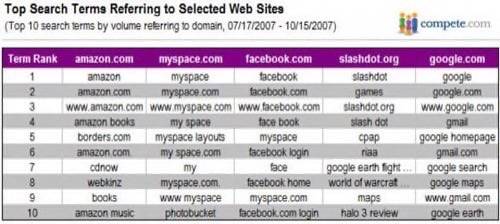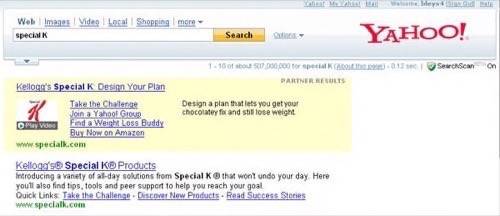Last week I was watching TV and saw something that really caught my eye. It was a commercial for Special K, the breakfast cereal from Kellogg, and rather than end with a plug for the product’s web site — SpecialK.com — it advised people to search Yahoo! for “Special K” instead. I started to wonder two things: 1. is Yahoo! paying Special K for tack-on advertising? and 2. has searching really become so natural that it is more effective to tell people to search for your site than it is to tell them to visit directly?

To the latter question, the answer appears to be a somewhat surprising “yes.” Of the 10 fastest rising search terms on Google last year, 7 were for searches where adding a “.com” would have brought the user to the correct site. These are called “navigational” searches — searches done when the user already knows exactly where he or she wants to end up — and they make up a surprising large number of total seaches.

According to Compete last fall, navigational searches make up about 17% of all searches on average, more on Yahoo! and Live than on Google. For well-known web sites, Compete found that about 9 out of the top 10 search terms for that site tend to be some sort of variation on the domain. Surprisingly, people actually often search for entire domain names rather than type them into their browser’s address bar.
After a little digging, I found that Kellogg’s Yahoo! campaign actually began last December with their holiday TV commercial run. Hitwise reported that that holiday campaign boosted traffic to SpecialK.com and that almost two thirds of that traffic came from searches for “Special K.” Consumers were following the advice of the ad, as well, with search traffic to the domain skewing 53% toward Yahoo!
Update: Via Allen Stern, turns out the offline/online search promotion from Special K is even older — dating back to at least last October. He has some interesting suggestions for taking the concept even further over at his excellent blog.
While I couldn’t find out which way the money was flowing, Stephan Pechdimaldji of Yahoo!’s advertising PR team told me that the Special K search campaign had a 10 times better response rate than previous campaigns the company had run on Yahoo! It’s hard to say if that indicates that a call to action to search trumps a call to visit a site directly, or if only that TV ads are big traffic drivers.
Either way, search over URL seems to be a trend we’re likely to see more of. Advertising search boxes rather than .com names is already all the rage in Japan. Mac developer Cabel Sasser pointed out in March that search boxes with suggested terms are pretty much all you see on ads in Japan, but he wondered if search marketers and spammers might ruin that strategy in the US. That’s probably why Kellogg bought the top sponsored result for “Special K” on Yahoo! (and, for good measure, on Google as well).

Still, with the continued rise of the mobile web it would seem that long, unwieldy URLs will become even more cumbersome on devices with limited screen size. That makes search even more important, and driving consumers to your product via search seems like a safe bet.
















